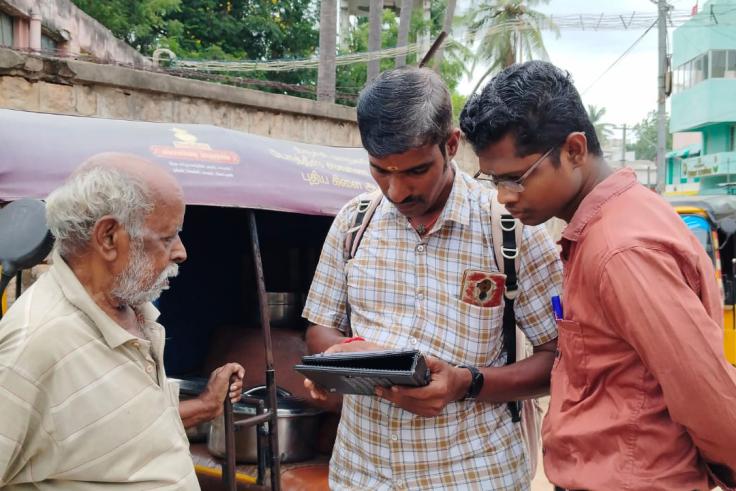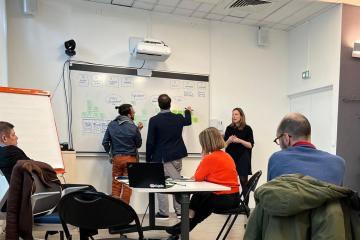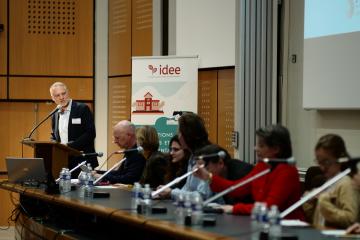Evidence-informed policy labs in governments help agencies pilot, test, and scale effective solutions for priority issues while also strengthening data and evidence use capacity.
Establish policy labs within government units to build lasting innovation capacity. These labs build government capacity to test, iterate, and scale evidence-based policies and programs.
Funders should support partnerships to launch new labs with innovation-minded governments for sustained evidence-informed policymaking. Policy labs that bring together governments and evidence-to-policy research organizations create sustainable systems for data-driven policymaking now and into the future.
Policy labs within governments institutionalize and increase capacity to generate and use evidence—enabling them to better adopt and sustain effective solutions. Governments are the primary providers of many essential services that work to reduce poverty. More effective public services can improve people’s well-being. Yet government processes and timelines can make it difficult to test new approaches or apply lessons from evaluation findings. Evidence-backed changes are most likely to stick when they are a part of, or build on, existing systems and government organizations' day-to-day operations.
Policy labs work within established systems to encourage a culture of innovation and learning. While, policymakers often value research findings, limited access to relevant findings can hinder the adoption of effective policies. Meanwhile, research co-developed with policymakers is substantially more likely to result in policy change. By creating a government unit in charge of sharing evidence, developing impact evaluations, analyzing administrative data, and supporting how to apply findings to decisions, policy labs enable testing and learning. Policy labs create dedicated space and resources for long-term learning aligned with government priorities–so that policymakers can more regularly use findings to improve public policies affecting millions of people.
Policy labs can accelerate learning on priority topics. In France, for example, the Innovations, Data and Experiments in Education (IDEE) Lab, in collaboration with J-PAL Europe and led by the federal government via the French National Research Agency, has already supported many projects with the Ministry of Education at national and local levels—from literacy and numeracy development to parental support interventions to tutoring programs.
Long-term partnerships between governments and organizations with expertise in research, evidence-based policy, and capacity building can be a promising approach to supporting policy labs. Policy labs can benefit from partnerships with organizations with large research networks, training resources, and experience setting up embedded labs. Long-term commitments allow for investing the time to understand the context, design relevant pilots, and run evaluations and follow-ups to assess the impacts of programs. For example, the IDEE model in France is an eight-year commitment, while J-PAL’s decade-long partnership with India’s Tamil Nadu state government has allowed evidence to inform programs across nine departments. Integration of the Egypt Impact Lab into the training institute of the Egyptian Ministry of Planning and Economic Development is another example.
Policy labs worldwide
J-PAL has been involved in creating 37 embedded policy labs and government partnerships aimed at institutionalizing a culture of evidence-informed policymaking worldwide. These labs work to generate evidence around government policy priorities, feed research findings into policy design, build government capacity to use evidence, and institutionalize evidence and data use. Embedded labs worldwide are informing a range of social programs and policies—from education in Peru to employment and livelihood in Morocco, to air and water challenges in several countries, and more.

Policy labs in high-income countries
Several governments in Europe have partnered with J-PAL to embed labs into their agencies. For example, IDEE helps education researchers produce actionable evidence in France by facilitating access to administrative data, providing research resources and tools, and structuring partnerships with policymakers and practitioners.
Together with a team of Spanish and international researchers, J-PAL Europe partnered with the Spanish Ministry of Inclusion, Social Security, and Migration to launch a lab focused on bringing evidence to policy-making in Spain. At the heart of the lab is an interest in generating lessons on how to complement or extend the effects of a new national minimum income scheme designed to support the country’s most vulnerable households.
Beyond Europe, several US states, cities, and counties have themselves created policy labs to increase their capacity for innovation and evidence use, several of which J-PAL North America has collaborated with. Examples include Colorado's Evaluation and Action Lab, which leverages evaluation expertise at the University of Denver, Minnesota Management and Budget, which offers evaluation expertise throughout the state, and North Carolina's Office of Management and Budget.
The role of philanthropy
Philanthropy plays an important role in providing seed funding to launch new labs and communicating lessons learned. For example, for the Spain policy lab mentioned above, Community Jameel and Foundation Ramon Areces supported the creation of products disseminating results from evaluations as well as events focusing on lessons learned about launching a lab.
In partnership with Community Jameel and Co-Impact, J-PAL has significantly expanded its efforts to forge evidence-to-policy partnerships with innovation-minded governments in Latin America, the Middle East and North Africa, South Asia, and Southeast Asia, seeking to use rigorous research to inform their social policies and programs.
“We thought of J-PAL because we knew that J-PAL is a reference in the academic world with a huge network of very distinguished academics and practitioners. And for us, it was also very important to introduce, from the outset, randomized controlled trials, in our experiments [and] in our pilots.”
—José Luis Escrivá, Governor, Bank of Spain; Former Minister of Inclusion, Social Security, and Migration, Government of Spain
Discover more from J-PAL
Discover more from other sources
Photos:
(1) The pedagogical gardens – WWF project in partnership with EVAL-LAB and J-PAL Europe. Credit: ©Mariajose Silva-Vargas
(2) Government surveyor accompanied by J-PAL supervisor administering the Panel Survey to an elder in Trichy, India. Credit: J-PAL




